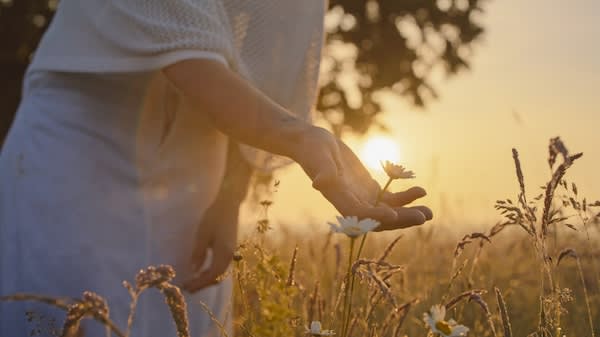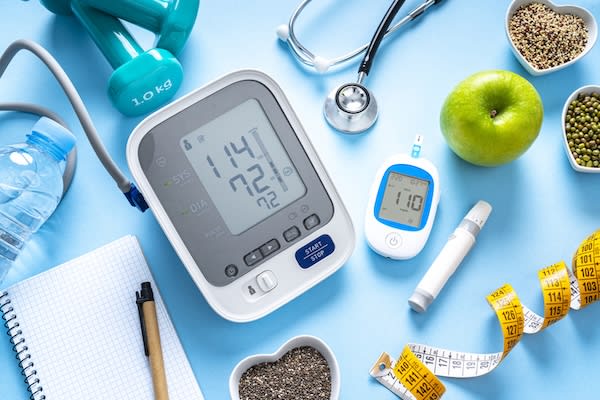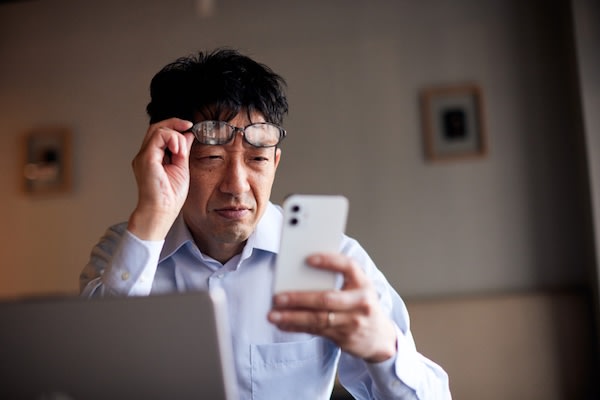Spiritual care in times of climate change
[6 MIN READ]
In this article:
-
In May, the world celebrates the 10th anniversary of the encyclical Laudato Si’, in which Pope Francis called for “swift and unified global action” in response to climate change.
-
At the Providence Center for Environmental Stewardship, there is interconnectedness between the vision of our founding sisters, our mission and the Laudato Si’.
-
Learn how the Laudato Si’ has impacted our caregivers and communities and how spiritual care brings us hope in times of climate change.
Spiritual care in times of climate change
In a document titled “Hopes and Aspirations for Providence Ministries,” the Sisters of Providence, one of our founding ministries, shared these sentiments: “We ask that you be good stewards of all we have been given for this ministry — our people, our resources, and our earth.”
These words are also shared in the Providence Laudato Si’ Reflection, a document that beautifully illustrates the interconnectedness between the hopes of the Sisters of Providence, the Providence mission, the sacred work done daily by our caregivers and the call by Pope Francis in his encyclical, Laudato Si’, that we all must take “swift and unified global action” in response to climate change.
This May, Providence and people worldwide celebrated the 10th anniversary of the Vatican’s release of Laudato Si’ (“Praise Be to You”). Here, we share how Providence has spent the last decade responding to the goals set forth in the Laudato Si’ as well as the importance of spiritual care in times of climate change.
What does Laudato Si’ call us to do?
“It’s not just a letter to Christians,” says Sister Sara Tarango, Sister of St. Joseph of Orange and environmental stewardship liaison in Southern California for Providence. “And it’s not just a letter to Catholics. It’s a letter to the entire world to see the urgency of the earth crying out. The cry of the earth and the cry of the poor are the same cry.”
The Laudato Si’ reminds us not to forget creation in everything we do.
“The health of the world and the health of the people are interconnected,” Sister Sara says. “Our No. 1 focus is the health of our patients. But how are we focusing on the health of the world so that our care can be more preventative?”
Sister Sara also asks us to consider the phrase “environmental stewardship” carefully. “Environment,” of course, is the space around us.
“But we don’t use the term ‘stewardship’ that much these days,” she says. “A steward is somebody who has been entrusted with something. Something has been given to you, something is awaiting your care. And now we’ve combined it with ‘environment.’ So how are we stewarding, or caring for, the environment?”
For more information about Laudato Si’, check out the Laudato Si’ Action Platform, the Laudato Si’ Movement and the movie “The Letter,” all of which followed the release of the encyclical.
The interconnectedness between Laudato Si’ our mission
Our mission calls on us to be steadfast in serving all, especially the poor and vulnerable. At the Providence Center for Environmental Stewardship, we believe a stable climate and a healthy planet are crucial to our vision: Health for a Better World. For the last 10 years, the goals outlined in Laudato Si’ have grounded us as we remain committed to caring for our common home, with boldness and compassion.
Per the Providence Laudato Si’ Reflection:
“Each of the seven Laudato Si’ Goals has strong and direct connections to Providence’s Mission, along with our values of Compassion, Dignity, Justice, Excellence and Integrity. The Mission and Values are deeply rooted in the scriptures and anchor our commitment to serve not only as a ministry of the Church, but also an education and social services ministry.”
Orest Holubec, chief mission experience officer at Providence, believes in the importance of action and setting an example for others.
“Our vision statement is Health for a Better World,” he says. “We believe if we do the healing work in environmental stewardship in our footprint, others will see it. And if we can show how we can do that in a way that doesn’t always cost money but always has benefits to the earth, our health system and the folks who live in our communities, then we’re convinced others will act as we do. We try to model behavior that we want to see in the world. We know that we can’t change the world on our own, but by example, we can make it a better place.”
Holubec also sees a clear alignment between the encyclical’s emphasis on humanity’s interconnectedness with the environment and Providence’s care for the whole person, physically, mentally and spiritually, as well as our communities.
“We take care of those who come to our doors, but we also reach out to those who are the most poor and vulnerable to ensure that they have access to the care that they need,” Holubec says. “Almost all of this work falls outside of our hospital walls. We go deep in how we serve in our communities, and that interconnectedness is what drives us. We’re impelled by our mission, and now with the platform brought forth in Laudato Si’ around interconnectedness, there’s a lot of alignment in how we’ve approached the issues in our communities as guided by the sisters and our founders.”
Sister Sara says you just have to look at our caregiver Green Teams, which she works with every day, to see this exemplified. As good stewards, the Providence Center for Environmental Stewardship shares its Green Team Toolkits to educate and help others adopt sustainable lifestyles that contribute to community empowerment.
The impact of Laudato Si’
“I would say the impact has been immense around a new understanding of interconnectedness,” Holubec says.
From the Laudato Si’: “Everything is interconnected, and this invites us to develop a spirituality of that global solidarity, which flows from the mystery of the Trinity.”
“That’s a powerful positioning of the work that the Laudato Si’ calls us to do, especially in terms of the poor and vulnerable, which are called out in our mission,” Holubec says. “Pope Francis described very effectively how environmental catastrophes and realities impact the poor and vulnerable disproportionately and how something that happens in one country impacts others living in another. We’re seeing that a lot now in the world. That focus on interconnectedness has provided a powerful platform for us to carry our work forward.”
Sister Sara spends a lot of time talking to Providence caregivers about the cry of the earth and the cry of the poor.
“When I talk about this with groups, I ask, ‘Who do you think are poor and vulnerable in our communities?’,” she says. “And I hear ‘migrants, refugees, this group, that group.’ It’s human beings. But I ask, ‘Can I challenge you to include others in that group? To see creation as being poor and vulnerable?’”
In the encyclical, Sister Sara says Pope Francis reminds us not to forget creation as we address the world’s many needs.
“Creation includes human beings and it includes a lot of other things — animals, trees, rocks, you name it,” she says. It includes everything God created.”
In addition to the 10th anniversary of Laudato Si’, 2025 marks 800 years since Saint Francis of Assisi composed “The Canticle of the Creatures.”
“It talks about Brother Moon and Sister Water,” Sister Sara says. “It talks about creation as kin. That is something that Saint Francis did, and it’s also something that our Indigenous brothers and sisters do. And it is something that I am starting to do more, looking at creation as my brothers and sisters.”
One of Sister Sara’s goals is to make the practice of environmental stewardship and viewing creation as kin hardwired throughout Providence.
“We talk about hardwiring, but we also talk about heart-wiring,” Sister Sara says. “We want it to just be how we are when providing health care, working in a lab, preparing a meal. Wherever you are in the hospital, we want these ideas and these concepts to be part of your regular thinking and routine.”
At work, Sister Sara says, we often use our heads and our hands, but it’s important to remember the heart.
“We need all three,” she says. “Hospitals are very resource intensive. They use a lot of different things. Is there a way that these things can be recycled, reused or, our favorite, avoided? That can look like a dish or an isolation gown that can be washed versus thrown into a landfill. How are we utilizing the resources we have? How do we think about the earth in our decisions?”
Holubec underlines the importance of practicality.
“We have to have practical approaches,” he says. “We need to have aspirational goals, but we also need a practical path to achieving those goals. And then we need to approach it with humility, knowing that we can’t solve all of these issues on our own, but that we can lead by example, and compel others to join us and ease their way in by sharing our toolkits, ideas and results.”
Spiritual care and climate crisis
People worldwide are celebrating the 10th anniversary of Laudato Si’ in public and personal ways. Part of that involves personal spiritual care as we all navigate the consequences of climate change.
“When I think about spiritual care and climate crisis, it takes me back to foundational questions, such as, ‘How do we view creation?’” Sister Sara says. “Is it a gift, or something we take for granted? I believe our relationship with creation has been broken for many years. We no longer grow our own food. We no longer spend hours outside. Most of us spend a lot of time inside, in front of a screen. That’s our reality right now, but that doesn’t mean our relationship with creation has to suffer. To have a relationship with someone or something, you have to spend time with it.”
For Sister Sara, this means meditation and intentional prayer.
“When we’re praying, how often does creation come up?” she says. “Probably some people pray for no rain for an important event or something like that but how often do we incorporate creation in a different, more relational way? We know that this is causing a lot of angst in the population. When people are displaced, and there’s heavy loss, that’s huge. And I think that’s why the sisters are so steeped in this work. Because it’s what we do, we serve others.”
Holubec says spiritual care leaders at Providence often see people in despair when they think about the environment.
“Spirituality should be a way to help address some of that despair,” he says. “We provide spiritual care for our caregivers and folks in our community who come to us for care, and we see a direct link in the power of healing when there’s strong spirituality.”
Caring for yourself spiritually in times of climate change can also be something as simple as stepping outside.
“There’s science that proves when you take a walk in a park or the forest, your overall health improves,” Sister Sara says. “I also know that intuitively. We need to hear birds. We need to walk amongst the trees. We need to put our feet on the ground.”
Holubec agrees.
“My family and I live in the Pacific Northwest for a reason,” he says. “All of God’s glory is available here for you. So I always try to spend some time alone outdoors, reconnect and remember how we’re all a part of this. I reflect on it and then think about how to be a part of the solution.”
Also, you need to have hope.
“What gives me hope are all these amazing caregivers that show up at the Green Team meetings with passion and ideas to change things because it does require change,” Sister Sara says. “Our mitigation strategy, WE ACT, We REACH and WE SHARE, is not a spectator’s area at all. It requires action from all of us. At Providence, there are thousands of us trying to make a difference every day. And our work isn’t a secret that we keep to ourselves. These are ideas that we share with as many people as we can.”
Holubec says his hope comes from watching people at Providence rally around practical solutions.
“Words are one thing, and they’re important, but what’s much more important is action and then a call to action as well for our caregivers in our communities and other health systems,” Holubec says. “And when all those things are done, and there are practical solutions that sometimes even have a positive return on investments financially, it creates a snowball effect in a positive way, and more people get involved. That’s where the hope lies for me, is in knowing that we are leading some of this very practical work in a way that we hope creates health for a better world.”
Contributing caregivers
Sister Sara Tarango, is a Sister of St. Joseph of Orange and environmental stewardship liaison in Southern California for Providence.
Orest Holubec is the chief mission experience officer at Providence.
Find a doctor
If you are looking for a primary care provider, you can search for one who’s right for you in our provider directory.
Download the Providence app
It’s all in the app: easily stay connected with Providence and your health. With the Providence app, you can schedule appointments, have virtual visits from the comfort of your own home, get health recommendations personalized for you, access your health records and so much more. Learn more and download the app.
Related resources
We SHARE in advocacy and leadership for the common good
Providence caregivers drive environmental stewardship
Celebrating Earth Day: Providence focuses on renewable energy
This information is not intended as a substitute for professional medical care. Always follow your health care professional’s instructions.



